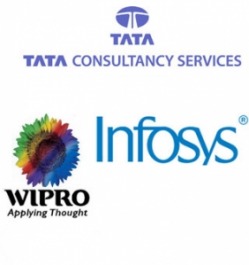 India’s top technology firms, including TCS, Infosys and Wipro, are preparing to increase the proportion of foreign employees in their workforce as they seek to address protectionist lobbies and position themselves as ‘job creators’ in the markets they serve.
The move comes in the wake of growing anti-offshoring sentiments in the US, the world’s biggest market for software services.
While TCS aims to double its foreign workforce from the current 10,000 over the next five years, Infosys and Wipro could see non-Indians account for 10-15% of their total employee base in three to five years’ time, from around 5% now.
“It’s a strategy to reverse the trend, as we realise that it’s necessary to shed the old way of getting only Indians to do the jobs,” said Pratik Kumar, corporate vice-president and HR head of Wipro. “How can you justify the fact that despite significant overseas revenues, we still have over 95% Indians on the payroll?” he added.Wipro aims to establish another centre in a tier-two US town after its Atlanta development centre becomes fully operational in a few months from now. Over the next two years, Wipro will have around 750 US citizens working at its Atlanta centre. “We aim to undertake significant local hiring, starting this year itself,” he said.
Among the top Indian technology firms, TCS employs the most number of non-Indians, accounting for almost 9% of TCS’ total workforce. Non-Indians account for around 5% of total workforce at Wipro and Infosys.
However, Mohandas Pai, HR head of India’s second biggest software firm Infosys says, despite all the hype around hiring more local workers, finding skilled professionals with adequate programming skills remains a challenge in the US and UK. “We want to double our foreign workforce, but don’t find people with adequate skills in those markets,” he said.
Source: The Economic Times
 Chennai: Bangalore-based MindTree, an IT solution company, is planning to invest around $20.5 million (Rs 102 crore) towards capital expenditure this year in 2009-10. The company is also planning to set up a new facility in Bhubaneswar. Speaking to Business Standard at the Emerge Out Conclave 2008, organised by NASSCOM in Chennai on Wednesday Krishnakumar Natarajan, managing director and chief executive officer, MindTree said the proposed investment of $20.5 million is up from $11.5 million last year. The investment will be towards creating additional facilities in Chennai and Bangalore.
At Chennai, the company is setting up a facility to accommodate 3000 people at Mahindra City which will focus on software development. Similarly the company has acquired 20 acre of land in Bhubaneswar for setting up a software testing and product development facility. Investment on the new facility is in the drawing stage, he added.
Natarajan said all these facilities will be to address future requirements, so it will not accommodate all the 3000 immediately. “It’s all depend on how business is going to pick up and when the economy bounce back.”
In 2009-10, the company is planning to recruit 250 people from the campus. Currently it employs 7860 people across the globe.
For the year-ending 2009, MindTree’s consolidated revenue rose 46.1 percent to $269.1 million while net profit fell 55.5 percent to $11.4 million, it said in a statement.
For the fiscal 2009-10 the company had set a target to increase the revenue to $290-300 million (around Rs 1,450 crore to Rs 1,500 crore) and net profit to $38-39 million (Rs 190 crore to Rs 195 crore).
The company is looking at verticals including energy and independent testing in infrastructure, which would lead the growth, said Natarajan.
Source:Business Standard
 NEW DELHI: Indian tech majors Infosys Technologies and Wipro are set to enter the booming domestic back-office service market, multiplying by more than one-third every year, and join a tech revolution happening in rural India.
Infosys BPO, the $316-million back-office service arm of Infosys, plans to tie up with service providers with shops in rural areas and small towns for its domestic operations, company officials said. The revenue-share model will see Infosys getting the customers and the rural operators doing the service. The $395-million Wipro BPO too will enter the domestic market soon. It already provides technology and other supports to a few rural service providers and may also explore service delivery tieups with them, company officials said.
So far, both the firms have been servicing only global clients. But, with global demand falling (Nasscom revised the growth to around 16% a year from around 25% earlier) due to the downturn in the US and other western economies, the domestic market, estimated at $1.6 billion and growing at an annual compounded rate of 38%, has gained a momentum.
Now going to remote, rural areas could be the next big shift to offer everything from native language capabilities to data entry type services.
The idea is the same as moving jobs from the US to India – to cash in on cheaper talent and office space. Amitabh Chaudhry, CEO and MD of Infosys BPO, says, “Tying up with rural service providers will keep our gross margins from domestic business similar to those from international business (22-24%).’’
The average billing rate for domestic clients is just $3-4 per hour for every employee, compared with $8-12 offered by global clients. This makes offering services to domestic clients from metros and big cities almost unviable.
Hence the move to rural areas that are some 60% cheaper. For instance, in a tier 1 city, a fresher gets about Rs 8,000, while in a tier III city it is around Rs 3,500, and even less in villages.
At present there are about a dozen rural BPO players including RuralShores, HOV Services, Sai BPO and DesiCrew in India, accounting for just a fraction of the domestic industry.
Tie-ups with the likes of Infosys and Wipro will help these small startups attract big clients in mobile phone and banking industries that are making major inroads into rural markets.
“We are talking to some big companies for partnerships,” says Murali Vullaganti, CEO of RuralShores, a 12-month-old startup that gets technical support from Wipro.
“It makes sense for rural BPOs to look at tieups as they may not be able to bag large contracts on their own,” says Chaudhry. “Besides revenue share, we will also train people in villages and tier II, III towns,” he adds.
These centres do routine tasks like data entry, processing of utility bills, native language help desk and e-mail response, says Avinash Vashistha, CEO of Bangalore-based advisory firm Tholons. They are, however, not expected to scale up dramatically. That’s because, while the manpower is cheap its availability is extremely limited. There are other limitations like lack of skilled manpower, poor broadband connectivity and frequent power blackouts.Says Ashutosh Vaidya, senior VP and head of Wipro BPO, “Rural areas will be good for some niche tasks and work well as a hub-and-spoke model, with tier II and III cities also playing a big role in the domestic space.”
Ananda Mukerji, MD and CEO of Firstsource Solutions, which services both international and domestic clients, agrees it makes sense to have a distributed capability to access talent and cut costs. “We are also looking at leveraging rural areas or very small towns for delivering services,” he adds. Firstsource has about 10,000 of its 22,000 people serving the domestic market.
RuralShores – which has a 160-people center in Bagepalli village, three hours from Bangalore, and another one at Ratnagiri in Vellore district of Tamil Nadu – is planning to open 500 village centres across the country over the next seven years, each with 20-30 seats.
Infosys BPO, which has 100 people for domestic business, will ramp up the number to 500 in the next six months, largely through tie-ups with rural players, Mr Chaudhry said.
He refused to discuss the revenue-sharing model or identify any firm Infosys was in talks with, but said a couple of village-based players around Bhubaneshwar and Udaipur were likely partners. While Infosys BPO, which has already won a contract from the Karnataka income tax department and another state government project, is chasing mostly state-run companies, Wipro BPO is eyeing business from top 100 customers in India. So as the business spreads to the smaller cities and villages, your call to fix the desktop or buy a new mobile phone plan may well be answered from a village back office.
Source : Economic Times
 IT firm Wipro Ltd today reported 21.26 per cent growth in consolidated net profit at Rs 1,217.4 crore for the third quarter ended December 31, 2009.
Total income, as per Indian accounting norms, rose to Rs 7,055.8 crore during the December quarter of FY’10 from Rs 6,773 crore in the same period previous fiscal, Wipro said in a filing to the Bombay Stock Exchange.
“We reported another strong quarter driven by significant uptick in volumes. We have maintained margins despite a decrease in our rate realisation and a strong appreciation of the rupee,” Wipro Executive Director and Chief Financial Officer Suresh Senapaty said.
The company’s IT services business added 31 new clients during the quarter. At the end of December, the IT business increased its headcount by 4,855, taking the total employee strength to 1,02,746.
“We have seen a positive demand environment which has driven broad-based sequential growth across all our verticals, service lines and geographies. In 2010, we expect IT budgets to be flat to marginally positive,” Wipro Chairman Azim Premji said.
During the quarter, the IT Services business reported revenues of Rs 5,164 crore, a year on year growth of 2 per cent. IT Services business accounted for 74 per cent of the revenue.
Source : Press Trust of India
 New Delhi: India’s largest back-office firm Genpact on Wednesday announced the acquisition of US-based analytics and data management services provider Symphony Marketing Solutions (SMS), for an undisclosed amount.
Apart from expertise in data integration, modelling and consulting, the acquisition will see transfer of 1,200 SMS employees spread across centres in India and the US to Genpact’s payrolls. Currently, the Indian firm employs more than 37,000 people globally. Genpact shares rose 1.2% on Nasdaq, at 9.20 pm IST, post-announcement.
“SMS’ expertise across sectors will not only allow us to offer a broader range of services ranging from finance and accounting, procurement and supply chain to data management and advanced analytics solutions, but will also enhance smart enterprise processes in these verticals by leveraging strong insights,” Genpact chief executive Pramod Bhasin said.
SMS is a provider of analytics and data management services with domain expertise in the retail, pharmaceutical and consumer packaged industries. It is part of the India-based Software Technology Group of companies.
An industry expert close to the deal said that SMS will prove to be beneficial for Genpact as it comes with long term assured business from customers such as IRI.
US-based Information Resources Inc (IRI) has executed an eight-year contract, under which SMS will provide end-to-end data management and analytics services to the former. IRI is a provider of enterprise market information solutions and services and a strategic client of SMS.
In order to increase the proportion of long-term, predictable business, back office firms such as Genpact and EXL have been trying to acquire companies that bring assured revenues.
Genpact’s rival EXL had acquired a analytics firm, Inductis, last November. “However, the EXL deal did not prove to be too beneficial, as the business was mostly project based,” said an industry tracker familiar with these transactions. Both Genpact and EXL share Oak Hill as a common investor.
“We realised the need to have critical mass in terms of size, scale and client relationships to significantly accelerate growth and enable IRI and other clients to offer more value to their end-customers,” STG chairman Romesh Wadhwani said.
The combination of SMS’ domain expertise and capabilities in several verticals and Genpact’s scale and breadth of services and global delivery footprint creates a compelling value proposition, he added.
Recently Genpact was in news for having initiated talks with BPO firm Intelenet Global Services for a possible buyout. Genpact also acquired US’ largest drugstore Walgreen’s accounting back office in Danville as part of a 10-year outsourcing contract.
Source : The Economic Times
|





 RSS Feed
RSS Feed